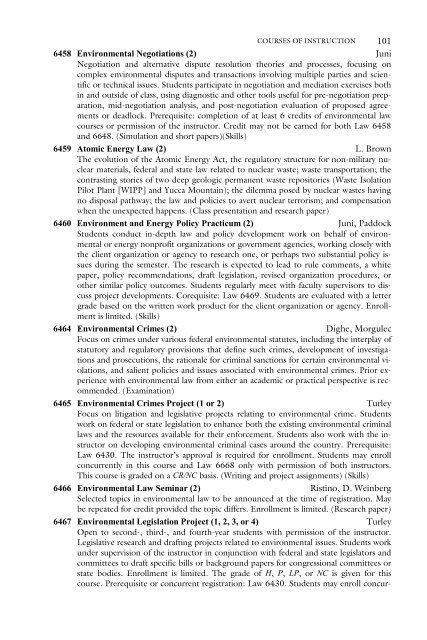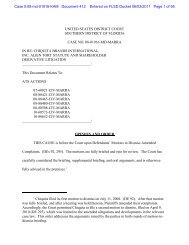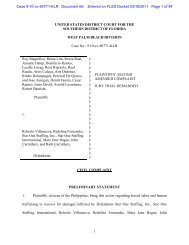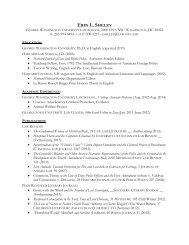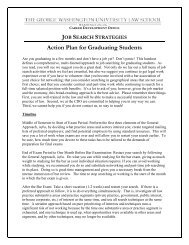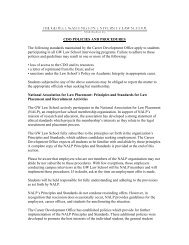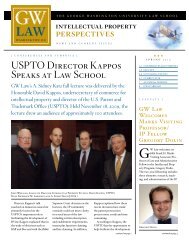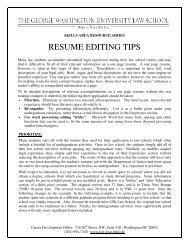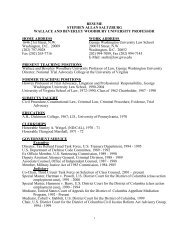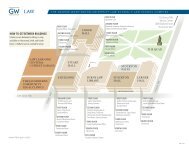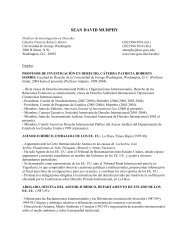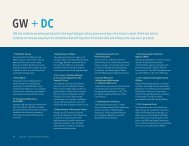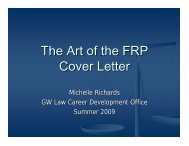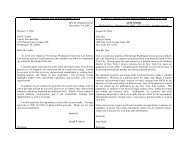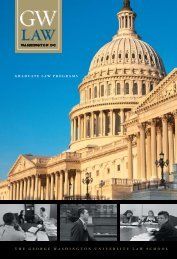The Bulletin - George Washington University Law School
The Bulletin - George Washington University Law School
The Bulletin - George Washington University Law School
- No tags were found...
Create successful ePaper yourself
Turn your PDF publications into a flip-book with our unique Google optimized e-Paper software.
COURSES OF INSTRUCTION 1016458 Environmental Negotiations (2) JuniNegotiation and alternative dispute resolution theories and processes, focusing oncomplex environmental disputes and transactions involving multiple parties and scientificor technical issues. Students participate in negotiation and mediation exercises bothin and outside of class, using diagnostic and other tools useful for pre-negotiation preparation,mid-negotiation analysis, and post-negotiation evaluation of proposed agreementsor deadlock. Prerequisite: completion of at least 6 credits of environmental lawcourses or permission of the instructor. Credit may not be earned for both <strong>Law</strong> 6458and 6648. (Simulation and short papers)(Skills)6459 Atomic Energy <strong>Law</strong> (2) L. Brown<strong>The</strong> evolution of the Atomic Energy Act, the regulatory structure for non-military nuclearmaterials, federal and state law related to nuclear waste; waste transportation; thecontrasting stories of two deep geologic permanent waste repositories (Waste IsolationPilot Plant [WIPP] and Yucca Mountain); the dilemma posed by nuclear wastes havingno disposal pathway; the law and policies to avert nuclear terrorism; and compensationwhen the unexpected happens. (Class presentation and research paper)6460 Environment and Energy Policy Practicum (2) Juni, PaddockStudents conduct in-depth law and policy development work on behalf of environmentalor energy nonprofit organizations or government agencies, working closely withthe client organization or agency to research one, or perhaps two substantial policy issuesduring the semester. <strong>The</strong> research is expected to lead to rule comments, a whitepaper, policy recommendations, draft legislation, revised organization procedures, orother similar policy outcomes. Students regularly meet with faculty supervisors to discussproject developments. Corequisite: <strong>Law</strong> 6469. Students are evaluated with a lettergrade based on the written work product for the client organization or agency. Enrollmentis limited. (Skills)6464 Environmental Crimes (2) Dighe, MorgulecFocus on crimes under various federal environmental statutes, including the interplay ofstatutory and regulatory provisions that define such crimes, development of investigationsand prosecutions, the rationale for criminal sanctions for certain environmental violations,and salient policies and issues associated with environmental crimes. Prior experiencewith environmental law from either an academic or practical perspective is recommended.(Examination)6465 Environmental Crimes Project (1 or 2) TurleyFocus on litigation and legislative projects relating to environmental crime. Studentswork on federal or state legislation to enhance both the existing environmental criminallaws and the resources available for their enforcement. Students also work with the instructoron developing environmental criminal cases around the country. Prerequisite:<strong>Law</strong> 6430. <strong>The</strong> instructor’s approval is required for enrollment. Students may enrollconcurrently in this course and <strong>Law</strong> 6668 only with permission of both instructors.This course is graded on a CR/NC basis. (Writing and project assignments) (Skills)6466 Environmental <strong>Law</strong> Seminar (2) Ristino, D. WeinbergSelected topics in environmental law to be announced at the time of registration. Maybe repeated for credit provided the topic differs. Enrollment is limited. (Research paper)6467 Environmental Legislation Project (1, 2, 3, or 4) TurleyOpen to second-, third-, and fourth-year students with permission of the instructor.Legislative research and drafting projects related to environmental issues. Students workunder supervision of the instructor in conjunction with federal and state legislators andcommittees to draft specific bills or background papers for congressional committees orstate bodies. Enrollment is limited. <strong>The</strong> grade of H, P, LP, or NC is given for thiscourse. Prerequisite or concurrent registration: <strong>Law</strong> 6430. Students may enroll concur-


